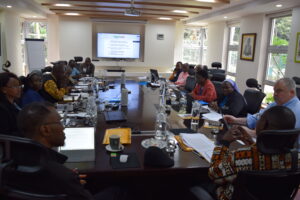By Paschal Norbert
NAIROBI, JUNE 25, 2024 (CISA) – In Nairobi from June 20 to 21, 2024, a diverse group comprising 14 African theologians, synod delegates, scholars, communicators, and experts convened under the auspices of the African Synodality Initiative (ASI) at the Jesuit Conference of Africa and Madagascar (JCAM)- Africama House. Their objective was to delve into the outcomes of the first session of the Synod on Synodality, with a specific focus on deepening the theological underpinnings of Synodality from distinctly African anthropological and cultural perspectives.
Fr Agbonkhianmeghe E. Orobator, SJ, a synod delegate and director of ASI, articulated the group’s central query: “What will really ground Synodality in the foundation of our Church?”
During his opening remarks outlining the group’s agenda and approach over the two-day meeting, Fr Orobator emphasized, “As Synodality unfolds, we aim for it to be deeply rooted in theological foundations and not just any theology. I hope the outcome of this meeting enriches what Africa can contribute to the theological foundation of Synodality. A richly textured voice that recognizes what complexities there are, what tensions there are and what our varied voices can build in this process.”
The primary goal of the gathering is to produce and publish a volume entitled “Living Theology of Synodality: The Face of a Synodal Church” from an African viewpoint. This publication will complement ASI’s initial release, “A Pocket Companion to Synodality and Training Toolkit on Synodality,” and offer an enhanced theological discourse and dialogue on Synodality that reflects the diversity of thought within the African context.
Each participant drafted and presented an initial working paper on themes such as Spirituality of Synodality, Theological Foundations of Synodality, and Charisms of Religious Life for a Synodal Church; Ethics of Synodality, Co-responsibility and Authority in the Church, A Synodal Church for the Young, and Women as Teachers of Synodality, among others. These papers formed the basis for intensive discussions aimed at refining and enriching the content.

Fr Ludovic Lado SJ, an anthropologist and Director of the Centre d’Etude et de Formation pour le Développement (CEFOD) in N’Djamena, Chad, remarked, “I hope this contributes to an African understanding of Synodality. There isn’t just one approach; diversity in perspectives is crucial. It’s beneficial to explore this from an African viewpoint and consider what we can offer to the Universal Church.”
Following reflections on the outcomes of the First Session of the Synod on Synodality and deliberations at Africama, participants identified areas of consensus and divergence within the African Church that require deeper reflection to foster unity. They underscored the significance of baptism as the authority granting all faithful credible voices as equal participants and contributors to Church reform and its broader mission.
The meeting also highlighted the need for ongoing discourse on the hierarchical nature and tools of authority of the Church. While proposing a shift towards co-responsibility where the faithful and clergy share in the mission of the Church, participants noted it is not possible to have a community without authority and acknowledged society’s legitimate need for authoritative structures within the Church.
The gathering affirmed that Synodality is a spiritual journey deeply rooted in human experience and spirituality, advocating for a comprehensive study of how African cultural values, challenges, and perspectives can provide a robust foundation for Synodality.
Participants stressed the importance of proactive planning for reactions to Synodality during and after its sessions. They envisioned a Church where all stakeholders feel heard, accompanied and respected, irrespective of their views on Synod outcomes.
The two-phase gathering will culminate after the Second Session of the Synod in October 2024, with the publication of a monograph on the Theology of Synodality in early 2025, aimed at incorporating a thorough theological analysis of the African perspective on Synodality.
